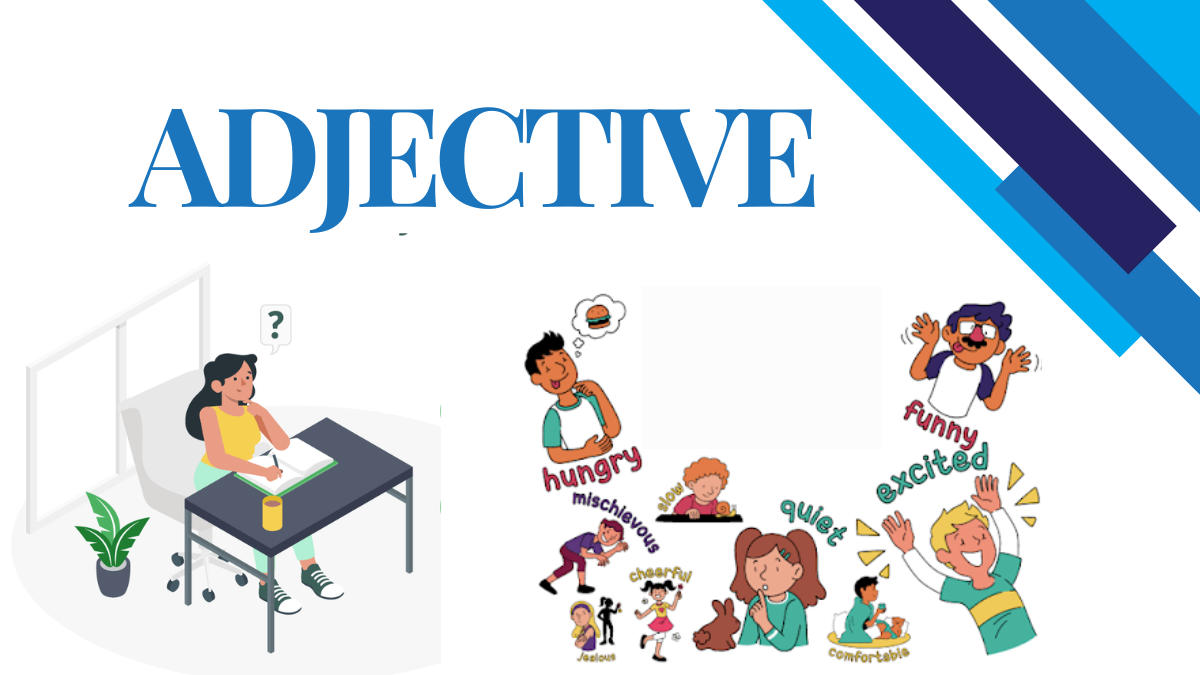An adjective is fundamentally a word that describes or alters a noun or pronoun. It gives extra details about the noun, assisting the reader or listener in creating a clearer mental picture. Adjectives are language instruments that enable us to express the features, properties, or qualities of the subjects we are speaking about. Adjectives help us communicate the nuances that make every experience distinct, whether we’re talking about the weather, someone’s looks, or the flavor of a delicious meal.
Adjectives
Do you ever get a compliment that you are beautiful? right, several times. Beautiful, ugly, fast, tall, big, small, honest, attractive, and slow are examples of complimenting words. Adjectives are words that are used to modify or denote the quality or quantity of nouns or pronouns. In this topic, we are going to discuss different types of adjectives, degrees of adjectives, and their functions, with examples.
What are Adjectives Meaning?
Imagine you’re building a vibrant word garden, and at the center of this garden stands a majestic tree. This tree represents the nouns—the fundamental element that gives life to a sentence. But what adds the captivating colors, the delightful scents, and the captivating charm to this tree? It’s the adjective!
An adjective is like a bouquet of fragrant flowers, each petal representing a different quality that embellishes and describes the noun. It’s the painter’s brush, splashing vivid hues onto a blank canvas. It’s the magician’s wand, conjuring an aura that captivates the reader’s imagination.
Adjectives are the wardrobe stylists for nouns, carefully selecting the most exquisite outfits to adorn them. They can make a plain word shimmer with elegance, transforming a simple “house” into a cozy “cottage” or a tiny “kitten” into an adorable “fluffy ball of fur.”
But adjectives are not just about appearances. They have the power to evoke emotions, like a melodious symphony that touches your soul. They can turn a mere “journey” into an exhilarating “adventurous expedition” or a regular “meal” into a mouthwatering “culinary delight.”
Like stars in the night sky, adjectives illuminate the darkness of a sentence, guiding our imagination through the depths of storytelling. They help us create vivid mental pictures, enabling us to taste, smell, hear, and feel the world around us even through the written word.
So, let your words bloom with the enchantment of adjectives. Let them paint a masterpiece of expression that ignites the senses and leaves a lasting impression. Embrace the power of adjectives and watch your sentences come alive with vibrant, mesmerizing beauty.
Adjectives Definition and Examples
The adjective is a part of speech that is used to modify or describe quality. quantity, number of a noun or pronoun. In other words, modifies nouns or pronouns by describing, identifying, and quantifying words. According to the Merriam-Webster Dictionary, an adjective is “a word belonging to one of the major form classes in any of many languages and generally serving as an emulsifier of a noun to denote a quality of the thing named, to indicate its quantity or extent, or to clarify a thing as distinguishable from something else.”
“A word that describes a noun or pronoun” is how the Cambridge Dictionary defines an adjective. A more detailed definition can be found in the Collins Dictionary. It states that an adjective is a term that characterizes or provides further information about a person or object, such as “big,” “dead,” or “financial.” Adjectives typically follow link verbs or come before nouns.
For example,
1. I have nine candies in my pocket. (how many)
2. I love that yellow sunflower.(which one)
Examples of Adjectives
- “The red apple is ripe.” (The adjective “red” describes the noun “apple.”)
- “The happy dog wagged its tail.” (The adjective “happy” describes the noun “dog.”)
- “I am feeling tired.” (The adjective “tired” describes the pronoun “I.”)
Adjectives Types
There are different types of adjectives, discussed below —
Adjectives of Quantity
It conveys the quantity or number of nouns or pronouns.All, no, few, many, any, some, each, either, every, whole, sufficient, most, none, and little are some examples.
1. Give some water to drink
2. you need much courage to do this.
In the above sentences, Some and Much are two Adjectives that use to denote quantity.
Adjectives of Quality
we use these types of adjectives in our daily life frequently. This adjective is used to represent the quality of the noun or pronoun (subject).Some adjectives that denoted quality are – Beautiful, ugly, fast, slow, some, little, etc
This is a beautiful garden.
In the above sentences, Beautiful describes the garden and how it looks. Where beautiful describes the quality of the subject or garden.
Adjectives of Numbers (Numerical Adjectives)
A numeral adjective is one that tells us how many, how much, or what order the noun is in.
Numerical adjectives are mainly 3 types-
1. Definite numeral adjectives,
2. Indefinite numeral adjectives,
3. Distributive numeral adjectives
For example,
1. Three cows are there (definite)
2. There are many cows (indefinite)
3. Every citizen must come forward. (distributive)
Perticipial Adjectives
Types of Adjectives (based on function)
Based on function Adjectives are 5 types-
Demonstrative Adjectives
Demonstrative adjectives are used to show the position of the noun and pronoun. Example-
1. This pen is mine
2. Give me those books.
3. This is my room.
Interrogative Adjectives
Some adjectives modify nouns and pronouns and make them interrogative.
they are what, which, where, how, etc.
1. which dress is yours?
2. what book do you want?
Exclamatory Adjectives
Here we can use these adjectives for any kind of exclamation remark. For example –
1. what a night it is!
2. what a weather!
Possessive Adjectives
Like possessive pronouns, these adjectives are used to show possession of a quality.
Eg- my, your, his, her, their, it, etc.
1. Give me my dress.
2. This is their house.
Emphasizing Adjectives
The emphasizing adjectives are adjectives that are used to emphasize/illustrate the previous noun.
E.g- Mind your own business.
Adjectives Forms
some adjectives are gradable which means these adjectives can be expressed on a scale of intensity—–
three degrees of adjectives are—
i. Positive adjectives – A positive degree of Adjectives used to denote equality in such scales with such corelatives as ‘as……….as’ or ‘so……..as’
eg- Misha is as tall as her sister.
ii. Comparative adjectives
Comparative Degree of Adjectives is used to compare persons, things, actions, events, or groups to another person or things, etc.
eg- Misha is taller than Rina.
iii. Superlative adjectives
A superlative Degree is used to compare somebody or something with the whole group that he/she/it belongs to.
eg- Misha is the tallest girl in their class.
Adjectives Forms List
Here a list of 3 types of degrees of commonly used words is given below
| POSITIVE | COMPARATIVE | SUPERLATIVE |
|
long
|
longer | longest |
| High | Higher | Highest |
| short | shorter | shortest |
| large | larger | largest |
| hot | hotter | hottest |
| Happy | happier | happiest |
| Gay | gayer | gayest |
| Beautiful | More/less Beautiful | Most/least Beautiful |
| narrow | Narrower | narrowest |
| Bad | worse | Worst |
| Good | Better | Best |
| Difficult | more difficult | most difficult |
| little | less | least |
Adjectives Examples
Adjectives can be formed by adding suffixes to nouns, verbs, and adjectives.
For example—-
Adjectives from Nouns
| Noun | Adjective |
| Skill | Skillful |
| Fool | foolish |
| Gold | Golden |
| Dirt | Dirty |
| Year | Yearly |
| hope | hopeful |
Adjectives from Verbs
| Verb | Adjective |
| Move | movable |
| Create | creative |
| Talk | talkative |
| Advise | Advisory |
| Exclude | Exclusive |
| Eat | eatable /edible |
Adjectives from Adjectives
| Adjective | Adjective |
| Red | Reddish |
| Two | Twice |
| Large | Largely |
| Economic | Economical |
| Tragic | Tragical |
20 Adjective Examples
Here are 20 simple examples of adjectives:
- Happy
- Sad
- Tall
- Short
- Fast
- Slow
- Bright
- Dark
- Big
- Small
- Brave
- Timid
- Cold
- Hot
- Funny
- Serious
- Loud
- Quiet
- Beautiful
- Ugly
Adjective Examples in Sentences
1. He was my Maths Teacher in Class 10
2. Mr. Choudhury is an honest man.
3. Platinum is the costliest of all metals
4. Rajasthan has the largest state in India.
5. Sohel is senior to me.
6. Human is the most intelligent animal.
Adjectives Exercise
Direction- Fill in the blanks with suitable Adjectives listed below.
[old, green, common, clever, warm, permanent, year, open, silver, grave ]
(i) I kept the book on_______ shelves.
(ii) They are the_______ residents of the locality .
(iii) I have ___________ subscription for this magazine.
(Iv) It was a _______move.
(v) This room is_______
(Vi) Wood is a_______material for making furniture.
(Vii) Every cloud has a_______ lining.
(viii) The bird has its nest in the _______ bush.
(ix) The Policeman was an ______ man.
(x) This is a very ________ matter.









 English Poems for Kids of Class 1 to 5, ...
English Poems for Kids of Class 1 to 5, ...
 Most Repeated Questions from Class 10 En...
Most Repeated Questions from Class 10 En...
 Republic Day Speech In English 2025, 26 ...
Republic Day Speech In English 2025, 26 ...









